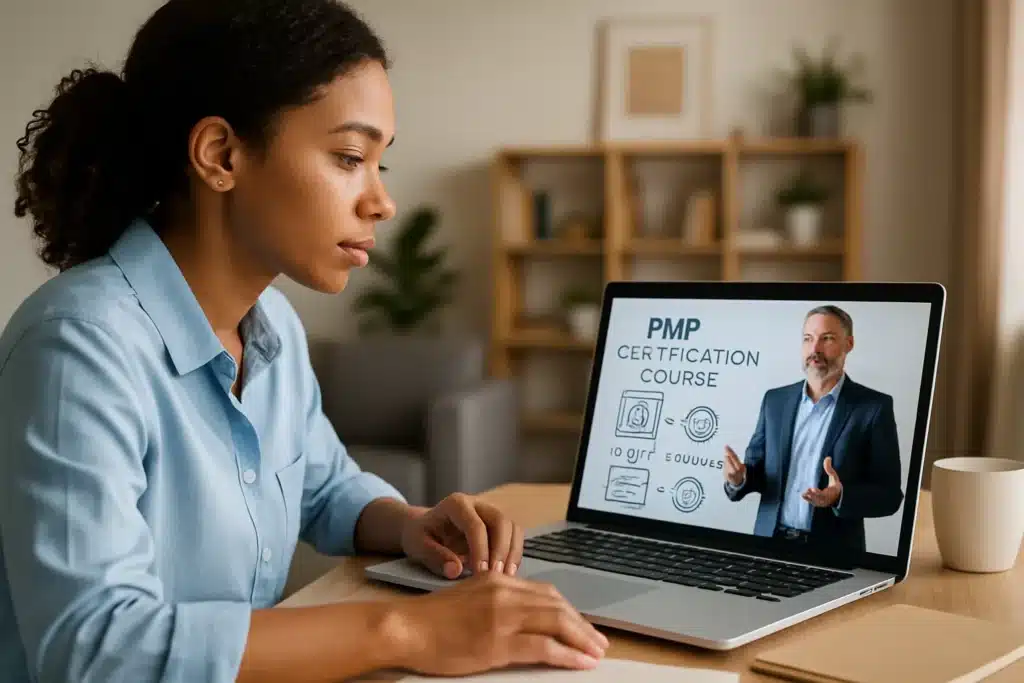What Is a PMP® Certification Course and Why Does It Matter
Author: Alvin Villanueva, PMP®, PMI-ACP®; Editor: Geram Lompon; Reviewed by: Grace Payumo, PMP®
If you’re looking to lead with impact, drive results that matter, and stand out in a crowded field, it begins here. The PMP® certification course isn’t just a training program; it’s a blueprint for becoming a trusted and strategic project leader.
Offered by the
Taking the right PMP® course equips you to deliver high-value outcomes, lead teams with purpose, and manage projects with confidence.
You’ll build a strong foundation in
A Clear Starting Point for Your Project Management Journey
You’re here because you’re serious about growth. Whether you’re leading small projects or managing high-stakes initiatives, experience alone isn’t always enough. A PMP certification course gives you formal structure, verified knowledge, and the kind of confidence that grows from using proven frameworks.
The PMP is more than a certification; it’s a mindset shift. It teaches you how to lead through uncertainty, balance priorities, and keep your teams focused when stakes are high.
What You’re Signing Up For
A high-quality PMP certification training course builds your ability to lead, adapt, and deliver consistent value. These programs are structured around the PMI Talent Triangle, which focuses on:
- Ways of Working: Tools and techniques to manage projects effectively
- Power Skills: Collaboration, communication skills, and influence
- Business Acumen: Understanding how projects support organizational success
This training prepares you for more than a test. It reshapes how you think, manage risk, and make decisions using the right tools.
Who Benefits Most From a PMP® Course
PMP training is ideal for professionals with experience in
Suppose you have at least 36 months of experience managing projects and hold a bachelor’s degree, or 60 months of experience with a high school diploma or its global equivalent. In that case, this course is designed for you (PMI, 2023).
It’s especially valuable for those with experience leading projects who now want formal recognition. These are the PMP certification requirements that experienced project managers often meet before applying.
Why It’s Different From General Project Management Education
Generic
The course encompasses project agreements, project compliance, hybrid approaches, and stakeholder dynamics, all within the framework of
The Signal It Sends to Your Career
Certification doesn’t define your leadership, but it amplifies your credibility. Hiring managers, clients, and teams will see your commitment and ability. PMP holders earn more, get promoted faster, and are trusted with complex work (PMI, 2023).
Online PMP training allows you to learn at your own pace and on your schedule. Many include practice exams, official course material, and support for passing the PMP exam on the first attempt.
To simplify your journey, explore the ROSEMET PMP Course Bundle. It includes everything you need to succeed, such as study tools, practice simulations, mentorship, exam prep, and exam application walkthroughs—all backed by a money-back guarantee.
It’s an Investment That Pays Off
This isn’t a shortcut or a formality. It’s a focused, strategic step toward a higher earning potential and more satisfying project work. PMP-certified professionals earn 25% more than their uncertified peers (PMI, 2023).
You’re not just checking a box. You’re building long-term capability through world-class
What’s Inside a PMP® Certification Course
Every PMP certification course shares a common backbone: the PMI Exam Content Outline. But the way it’s delivered and the support behind it determine your success.
An excellent course doesn’t just teach; it also inspires. It transforms how you approach complexity, team leadership, and business alignment.
The Core Curriculum
Every reputable PMP certification course follows the PMI Exam Content Outline (ECO). It covers:
- People: Building trust, resolving conflict, and engaging teams
- Process: Executing project tasks, monitoring progress, and managing scope
- Business Environment: Aligning with strategy and adapting to change
Expect immersive course content that ties back to project goals, the triple constraint, and real-world deliverables.
Beyond the Basics
An intense course offers more than slides. Look for one that includes:
- Interactive video lessons and downloadable course material
- Full-length practice exams with multiple-choice and scenario-based formats
- Timed simulations and feedback to reinforce PMP prep
- Access to industry experts who clarify complex concepts
You’ll also tackle
Which Format Fits You Best
Modern PMP training is available in flexible options that accommodate your life and schedule. The proper training delivery method can make all the difference in staying consistent with your prep.
- Self-paced: Study anytime, at your speed
- Instructor-led: Join live cohorts with expert guidance
- Hybrid: Combine structured sessions with on-demand content
Choose based on your learning style, and don’t overlook providers that offer exam prep support and exam application coaching.
Authorized Training Partners vs. Independent Course Providers
According to PMI’s Authorized Training Partner guidelines, PMI vets specific providers as Authorized Training Partners (ATPs). These organizations must deliver training using PMI-issued slide decks and adhere strictly to the institute’s prescribed curriculum. With an ATP:
- Your 35 contact hours are instantly validated.
- You use up-to-date PMI materials.
- You study with certified instructors who follow the exam blueprint.
While ROSEMET is not an ATP by choice, this allows us to prioritize teaching what works in practice. We develop our high-impact course content rooted in real-world experience, without being constrained by PMI-issued slides.
Industry experts lead the ROSEMET PMP Course Bundle, which includes guided feedback, readiness scoring, practice exams, and coaching, all designed to promote flexibility, accuracy, and learner success.
Add-Ons That Give You an Edge
Not all PMP courses are created equal. The best ones anticipate what you need, even before you know you need it.
Top-tier programs may include:
- Application coaching and audit-proof documentation
- Career support with real job outlook insights
- Lifetime access, course updates, and renewal discounts
These extras position you for success across the exam and your next project.
Your Learning Becomes Leadership
The real value? You lead differently. You manage expectations, deliver project benefits, and pivot effectively in the face of uncertainty.
That shift doesn’t fade after the exam. It grows with you and supports you across industries, from information technology to construction.
Are You Eligible for PMP® Certification
Before enrolling in a PMP certification course, it’s essential to confirm that you meet PMI’s eligibility criteria. Thankfully, the requirements are transparent and rooted in your education and leadership experience.
Eligibility doesn’t require a formal title. It requires proof that you’ve been responsible for project outcomes, team alignment, and value delivery.
What PMI® Requires
Eligibility is based on education and experience:
- Four-year degree: 36 months of leading projects within the past eight years
- High school diploma or associate’s degree: 60 months of project leadership
- 35 hours of
project management education or Certified Associate inProject Management (CAPM) certification
(PMI, 2023)
What Counts as Experience
You don’t need a formal project manager title. PMI cares about whether you:
- Led project tasks and decision-making
- Oversaw scope, resources, or stakeholders
- Delivered project outcomes aligned with business goals
That’s leadership, and it demonstrates actual
How the Application Process Works
The PMP application is done online. You’ll list:
- Educational background and credentials
- Your projects, including role, objectives, and duration
- 35 hours of training proof
The ROSEMET course bundle includes templates and examples to simplify this process.
What to Expect After You Apply
PMI reviews your submission in 5 to 10 days. If audited, you’ll need to submit:
- Your diploma or transcript
- Supervisor-verified experience summaries
- Proof of
project management education
Once approved, you’ll pay the exam fee and select your testing date.
What to Do Before Exam Day
Your eligibility lasts 12 months, and you can attempt the exam up to three times. Prepare by:
- Taking full-length practice exams in timed settings
- Reviewing performance breakdowns and feedback
- Reinforcing weaker topics using interactive tools and flashcards
Look for programs that combine exam prep, PMP prep strategy, and expert coaching.
How It Shapes You
By the time you apply, you’ve already evolved. You’re leading meetings with clarity, spotting project risks sooner, and aligning outcomes with project goals.
The certification formalizes what you’ve built through structured
What Happens After PMP® Certification
Completing your PMP certification is the beginning of a new chapter. You now hold the credential that distinguishes strategic leaders in every industry.
This part of your journey is all about application, visibility, and sustained growth.
The Real Impact Begins
Once you pass the exam, your PMP credential sends a clear message. You can lead across industries, manage complexity, and support organizational change with precision and effectiveness.
This is when your learning transforms into tangible leadership and broader career opportunities.
Career Growth and Earning Potential
PMP-certified professionals:
- Earn up to 25% more than peers without the credential.
- Qualify for program manager and PMO leadership roles.
- Stand out globally for their credibility and versatility.
(PMI, 2023)
This isn’t just about pay. It’s about making an impact and gaining recognition across the project community.
How to Stay Certified
You’ll renew your certification every three years by earning 60 Professional Development Units (PDUs). These come from:
- Attending webinars and courses
- Mentoring or contributing to the PM community
- Completing leadership or Agile-focused training
Your learning continues, and your growth never plateaus.
What You’re Ready For Now
Your PMP credential prepares you to:
- Deliver results in both predictive and hybrid project settings.
- Lead strategic change initiatives across business units.
- Speak the language of value delivery in every conversation.
Certification is not the end. It’s the next level of capability.
You Did More Than Earn a Certificate
You developed new habits, built new systems of thought, and elevated your leadership. You didn’t just pass a test. You evolved.
And that’s precisely what the PMP certification course and the ROSEMET learning experience are meant to do.
References
Project Management Institute (PMI). (2023). Earning Power:
ROSEMET. (2024). PMP Course Bundle. Retrieved from https://www.rosemet.com/pmp-course-bundle/

